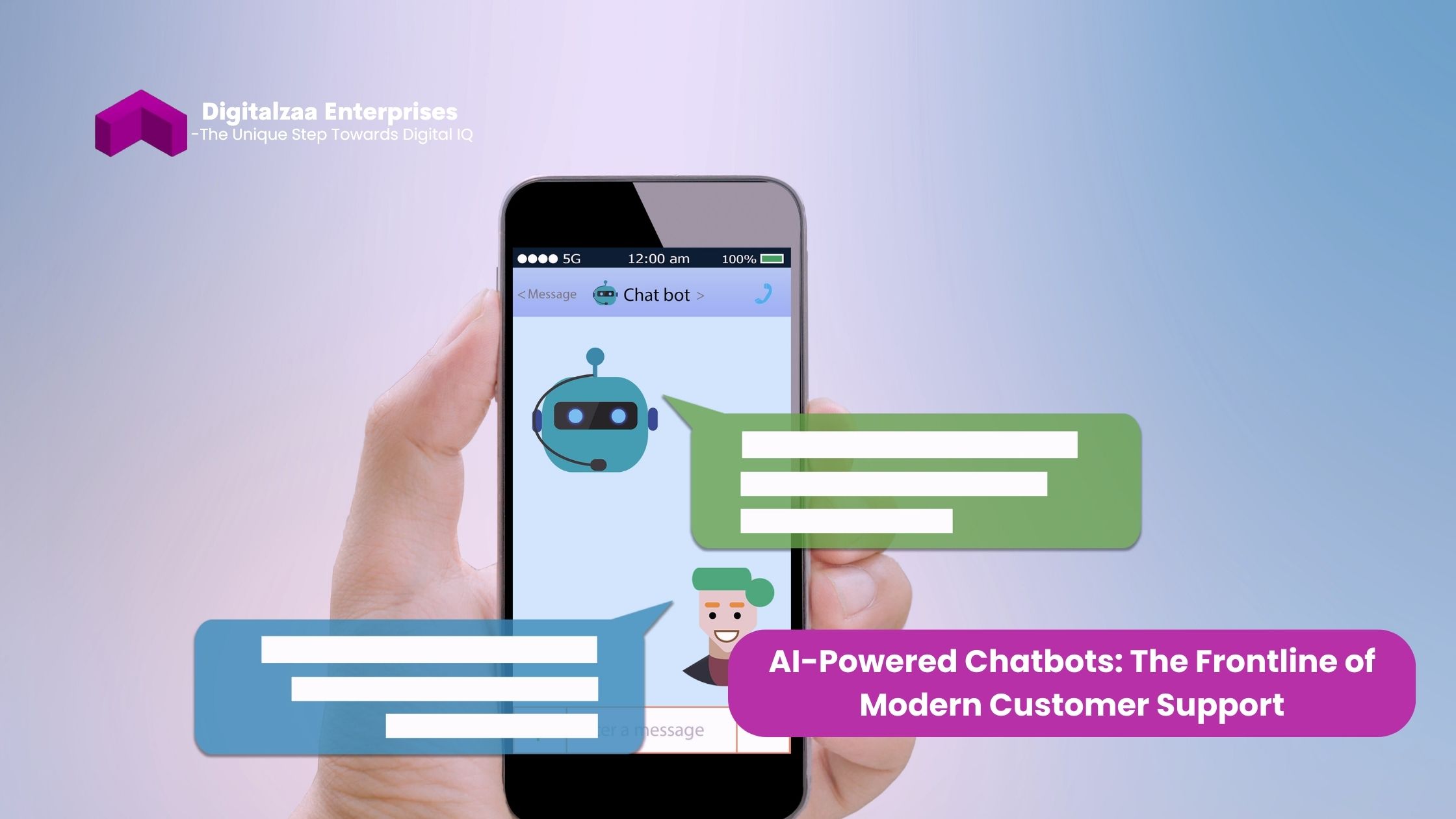How AI is improving website customer support and resolving issues faster.

In today’s digital landscape, fast, efficient, and accessible customer support can set a business apart. As customer expectations grow for instant and personalized service, companies are increasingly turning to Artificial Intelligence (AI) to enhance their customer support capabilities. AI-driven solutions are proving invaluable in transforming website customer support, making it faster, more accurate, and available around the clock. By integrating AI technologies like chatbots, natural language processing, and predictive analytics, companies can address customer issues swiftly and efficiently, often resolving queries without human intervention.
In this blog, we will explore how AI is improving website customer support and how these advancements allow businesses to provide superior service while also gaining insights into customer behavior and preferences.
1. AI-Powered Chatbots: The Frontline of Modern Customer Support

AI chatbots improve customer support in several ways:
- Instant Response: Chatbots provide an instant response to customer inquiries, eliminating wait times and ensuring that customers feel attended to immediately.
- 24/7 Availability: Unlike human agents, AI chatbots are available around the clock. This ensures that even during off-hours, customers can receive assistance, which is particularly useful for global businesses with customers in different time zones.
- Consistency in Responses: AI-powered chatbots follow a standardized set of responses, ensuring consistency. This can improve customer satisfaction as each user receives clear and correct information.
- Scalability: AI-driven chatbots can handle multiple conversations simultaneously, providing support to hundreds or thousands of users at once without compromising on speed or quality.
2. Natural Language Processing (NLP) for Better Understanding and Interaction
Natural Language Processing (NLP) allows AI-driven customer support systems to understand and process human language in a way that feels natural. Through NLP, AI chatbots and virtual assistants can analyze the intent behind customer inquiries, even when the phrasing is complex or informal. NLP improves customer support in these ways:
- Enhanced Understanding of Customer Intent: NLP enables AI to interpret not only what the customer is asking but also the intent behind it. This leads to more accurate responses and better issue resolution, as the AI can discern the true nature of the problem.
- Multilingual Support: NLP allows AI to communicate in multiple languages, enabling companies to serve a diverse customer base without needing language-specific support staff.
- Improved Sentiment Analysis: NLP can detect the sentiment behind a customer’s message. For instance, if a customer sounds frustrated or unhappy, the AI system can escalate the issue to a human agent or respond in a more empathetic manner, enhancing the customer experience.
3. Predictive Analytics for Proactive Customer Support

Predictive analytics leverages historical data and machine learning algorithms to anticipate customer needs and potential issues before they arise. With AI-driven predictive analytics, companies can proactively engage customers, reducing the likelihood of negative experiences and building stronger customer relationships.
Predictive analytics is helping improve customer support in several ways:
- Proactive Issue Resolution: By analyzing patterns in customer behavior and product use, predictive analytics can identify potential issues. For instance, if a customer frequently experiences a specific issue, the AI system can automatically send a guide or initiate a troubleshooting conversation before the customer even reaches out.
- Personalized Recommendations: Predictive analytics allows AI to deliver personalized recommendations. For example, if a customer frequently visits specific pages or asks about certain products, the AI can suggest relevant content or offer promotions, enhancing the customer experience.
- Reduced Churn Rates: AI can detect early signs of customer dissatisfaction, such as frequent support inquiries or high page bounce rates. With this data, customer support teams can reach out with targeted interventions to retain these customers, improving overall satisfaction and loyalty.
4. Intelligent Routing for Faster Resolutions
Intelligent routing uses AI to determine the best way to handle each support request. When a customer submits a query, the AI system can assess its complexity and urgency, then route it to the appropriate resource.
AI-driven intelligent routing enhances customer support by:
- Optimizing Resource Allocation: By automatically routing simple queries to chatbots and complex ones to human agents, AI ensures that resources are allocated efficiently. This leads to faster resolution times for all inquiries.
- Skill-Based Routing: AI can identify which support agents have the best skills to handle particular issues. For example, it can route technical questions to specialized agents, reducing the time spent transferring queries and improving resolution speed.
- Contextual Data for Agents: When routing queries to human agents, AI systems provide context by gathering relevant information from past interactions, chat logs, or customer profiles. This enables agents to address the customer’s needs without asking redundant questions, streamlining the support process.
5. Virtual Assistants for Hands-On Support
Virtual assistants, a step beyond simple chatbots, can engage in more complex conversations and handle tasks that require multiple steps. Virtual assistants can process various data sources and integrate with different systems to perform tasks like retrieving customer data, adjusting account settings, or completing transactions.
Virtual assistants improve customer support by:
- Providing Comprehensive Assistance: Virtual assistants can complete complex, multi-step tasks that basic chatbots cannot handle. This might include updating payment details, booking appointments, or modifying order information.
- Reducing the Need for Human Intervention: Since virtual assistants can perform more advanced actions, fewer customer interactions require escalation to human agents. This not only improves resolution speed but also allows human agents to focus on more complicated issues.
- Enhanced Personalization: Virtual assistants can access customer histories and preferences, enabling them to tailor responses and actions to individual needs, which boosts customer satisfaction.
6. AI-Driven Self-Service Portals
AI-powered self-service portals allow customers to find solutions independently, reducing the demand on customer support teams. These portals use AI to suggest relevant articles, troubleshooting steps, or FAQs based on the customer’s query.
AI self-service portals enhance customer support by:
- Enabling Customers to Resolve Issues Independently: Many customers prefer to find answers on their own. AI-driven self-service portals make it easy for customers to find the information they need without waiting for a response from an agent.
- Providing Contextual Guidance: AI can guide customers through troubleshooting steps by providing prompts and suggestions based on the customer’s specific situation.
- Learning and Improving Over Time: As customers interact with the portal, AI analyzes which articles are helpful and which are not. This feedback loop allows the portal to improve over time, ensuring that future customers receive even more accurate support.
Conclusion
AI is redefining the capabilities and reach of website customer support, empowering companies to deliver faster, more personalized, and highly efficient service. Through chatbots, predictive analytics, virtual assistants, and self-service portals, AI allows businesses to provide instant support, proactively address customer needs, and continuously improve based on data-driven insights. As AI technology evolves, customer support will become even more seamless, offering businesses a competitive edge in a world where speed and personalization are key to customer satisfaction.
By adopting AI-driven customer support solutions, companies can not only meet the demands of today’s customers but also build stronger, more loyal relationships with them, ultimately enhancing customer satisfaction and driving business growth.


